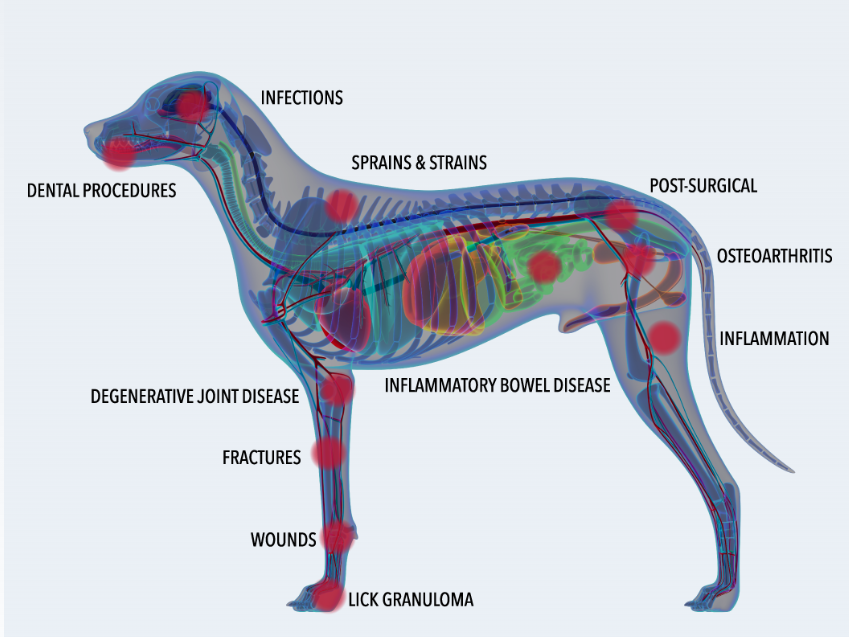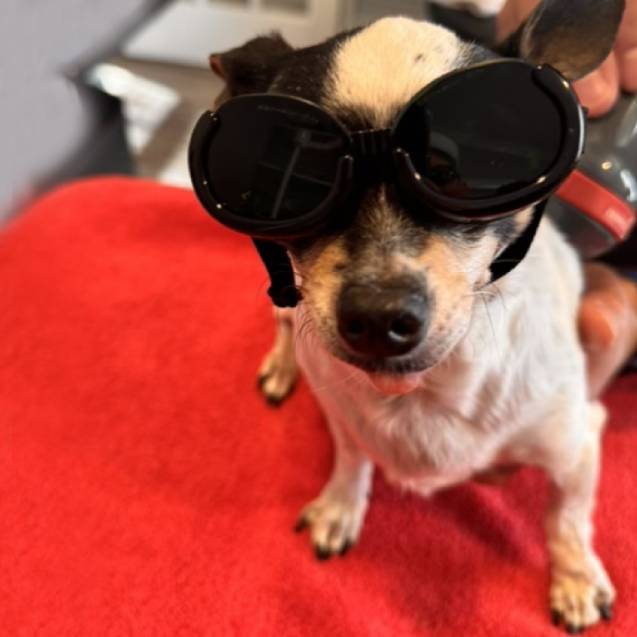Gold-Standard Care
Gold-Standard Care
***Available at Southeast Animal Hospital July 2025.
 Photo credit to LifeLearn.com
Photo credit to LifeLearn.com
The Rabbit Hemorrhagic Disease Virus 2 (RHDV2) vaccine is a crucial preventative measure for pet rabbits, especially given the virus's high mortality rate. A two-dose series, administered 3-4 weeks apart, is typically required for initial vaccination, followed by annual boosters. The vaccine is generally considered safe for rabbits 4 weeks and older.
The House Rabbit Society strongly recommends vaccinating all rabbits, including shelter rabbits, to protect them from this deadly disease.
 Photo credit to LifeLearn.com
Photo credit to LifeLearn.com
The Rabbit Hemorrhagic Disease Virus 2 (RHDV2) vaccine is a crucial preventative measure for pet rabbits, especially given the virus's high mortality rate. A two-dose series, administered 3-4 weeks apart, is typically required for initial vaccination, followed by annual boosters. The vaccine is generally considered safe for rabbits 4 weeks and older.
The House Rabbit Society strongly recommends vaccinating all rabbits, including shelter rabbits, to protect them from this deadly disease.
- Safety and Effectiveness: The vaccine has been shown to be safe and effective in trials, with most rabbits developing immunity after the second dose. Common side effects are mild and temporary, such as slight fever, lethargy, or swelling at the injection site.
- Vaccination Schedule: Rabbits can be vaccinated starting at four weeks old. The initial vaccination involves two doses, three weeks apart. After that, annual boosters are recommended.
- RHDV2 and its Impact: RHDV2 is a serious threat to rabbits, with a high mortality rate (70-100%). The virus can be transmitted through direct or indirect contact.
- Importance of Vaccination: Vaccination is a crucial preventative measure for pet rabbits to protect them from this devastating disease. Please call us to make an appointment 845-762-3510.
At Southeast Animal Hospital we offer both in hospital and online store options.
We will provide you with detailed instructions on the medication’s use, discuss any side effects or interactions, and even give your pet the first dose if possible. You can feel confident all the medications we dispense were obtained from safe, reliable sources and stored under the right conditions.
For your convenience you can text us your medication refill request to 845-769-0509.
What to expect when you’ve requested a medication refill through our in-hospital pharmacy?
Vetsource is our online store, please see the Online Store Tab to place an order.
Pharmacy Protocol's Compounding Pharmacies (Mixlab,Stokes etc): We work with many outside compounding pharmacies to prepare medications to meet the unique needs of an individual patient when a commercially available drug does not meet those needs. We call in the medications directly to the pharmacy, and they will contact you directly for payment and to set up shipment to your home.
Human pharmacy ***We do not work with, or call in prescriptions to CVS Pharmacies*** If you would like your pet's medication called into any other human/pet pharmacy, please provide your preferred pharmacy information, including the phone number. We will call the medication in directly, and then they will contact you to arrange pick up once the medication is ready. Please allow 24 - 48 hours for this request to be completed.
If you are using Chewy for your pets medication or food, you will need to pick up a physical script. Please allow us 24 - 48 hours to process a script request.
We want your decisions to be well informed as concerns with online pharmacies are growing within the Veterinary field:
Maintaining the integrity of these products and the warranties available through the manufacturers have led us to make this statement for our clients.
We will provide you with detailed instructions on the medication’s use, discuss any side effects or interactions, and even give your pet the first dose if possible. You can feel confident all the medications we dispense were obtained from safe, reliable sources and stored under the right conditions.
For your convenience you can text us your medication refill request to 845-769-0509.
What to expect when you’ve requested a medication refill through our in-hospital pharmacy?
- Once we receive your refill request, we start working on processing it as soon as possible. Please allow 6 – 12 hours to process your medication requests.
- If for any reason the medication cannot be refilled, our technician will call you on the phone number registered to your account.
- We will TEXT you when the medication is ready for pickup.
- We can send you a secure payment link to make the pickup process faster or if you’re sending someone else to pick it up for you.
Pharmacy Protocol's Compounding Pharmacies (Mixlab,Stokes etc): We work with many outside compounding pharmacies to prepare medications to meet the unique needs of an individual patient when a commercially available drug does not meet those needs. We call in the medications directly to the pharmacy, and they will contact you directly for payment and to set up shipment to your home.
Human pharmacy ***We do not work with, or call in prescriptions to CVS Pharmacies*** If you would like your pet's medication called into any other human/pet pharmacy, please provide your preferred pharmacy information, including the phone number. We will call the medication in directly, and then they will contact you to arrange pick up once the medication is ready. Please allow 24 - 48 hours for this request to be completed.
If you are using Chewy for your pets medication or food, you will need to pick up a physical script. Please allow us 24 - 48 hours to process a script request.
We want your decisions to be well informed as concerns with online pharmacies are growing within the Veterinary field:
- Many of the online companies limit the distribution of their products through licensed veterinarians, products obtained from many internet retailers could be acquired illegally through non-approved channels.
- The manufacturer cannot guarantee safe handling or appropriate storage, or that the product has not been tampered with when they are not obtained through a licensed veterinarian. For this reason, the companies will NOT honor their warranties/guarantees if the products are not obtained through a licensed veterinarian. This means that reactions to the medications or failure of the medications (ie: preventatives) are not covered by the manufacturer’s warranty.
- Pharmaceuticals manufactured for and labeled for use in other countries have been illegally diverted and sold through these discount pharmacies/online in the United States.
- Mass removals
- Gastrointestinal
- Cystotomy
- Spay And Neuter
- and more.
Mobius Veterinary Services offers quality mobile ultrasounds and internal medicine consultations directly to general practice colleagues throughout Westchester and the surrounding counties. We offer advanced diagnostic ultrasound capability performed in your hospital thereby allowing you to preserve and maintain your doctor/client/patient relationship.
Frequently Asked Questions about Ultrasound.
- Abdominal Ultrasound: This includes a full abdominal ultrasound with a clinical assessment of the findings and recommendations for future testing and/or therapy. The report is generated at the time of the ultrasound.
- Internal Medicine Consultation: This includes a full review of the medical record, a physical examination of the patient, and a written report of the case that will include clinical assessments and further diagnostic and/or therapeutic recommendations. This report is generated at the time of the consultation.
- Ultrasound guided fine needle aspiration: This includes a fine needle aspirate of one lesion or organ system. This procedure can often be done without sedation/anesthesia or other preliminary tests (i.e. coagulation tests).
- Ultrasound guided tru-cut biopsies: This includes a tru-cut biopsy of one lesion or organ system. This procedure usually requires sedation/anesthesia and preliminary testing (CBC, PT/PTT). As this is a minimally invasive procedure, we ask that you contact us prior to scheduling to discuss the case.
A key point of pet wellness is dog/cat parasite prevention. Parasites such as heartworms, intestinal worms, fleas, and ticks are relatively common, but pets do not always show outward signs of infection. Southeast Animal Hospital recommends year-round parasite prevention in addition to annual testing for heartworms and intestinal parasites to make sure your dog or cat is well protected.
INTESTINAL PARASITES Intestinal parasites include roundworms, hookworms, whipworms, tapeworms, and giardia. These pests are common in puppies and kittens, and often need to be treated at a puppy or kitten’s initial appointment. Worms’ eggs can be accidentally ingested or passed on to a pet that is nursing, but humans and pets alike can also unknowingly bring the eggs into their home. Dogs and cats with an intestinal parasite infestation will naturally pass worm eggs and larvae in their stool. If this stool isn’t cleaned up right away, it can result in the spread of parasites to animals and people. This makes intestinal parasite prevention essential, both for the health of your pet and the health of your human family members.
EXTERNAL PARASITES (FLEAS & TICKS) Fleas and ticks are common external parasites seen on dogs, cats, and other animals. Contrary to popular belief, fleas and ticks can be transmitted year-round – even in colder months. Many pets are usually exposed to these parasites due to proximity to other infected animals, or in yards, patios, and parks. Fleas and ticks can also be brought into the home if they hitch a ride on your pet or on your clothing. Fleas and ticks can cause itching, hair loss, anemia, allergies, and skin infections in pets, but they can also transmit other parasites. Fleas can pass tapeworms on to pets, and ticks can spread diseases (Ehrlichiosis, Rocky Mountain Spotted Fever, and Lyme disease) to pets and people. If your pet has been exposed to fleas, be sure to contact our hospital so we can help you eradicate the pests and ensure your home stays flea-free, too. Fleas can burrow into carpets and furniture and reproduce rapidly, and they are virtually invincible while in their pupa stage.
HEARTWORMS Heartworms are a potentially fatal parasite transmitted through infected mosquitoes. Common symptoms of heartworm infection in dogs include coughing, intolerance to exercise, and lethargy. Prevention with a consistent preventative and early detection testing via blood work are key to preventing, detecting, and treating heartworm disease.
How is Heartworm Disease Diagnosed? There are a few ways that heartworms can be detected and diagnosed. The first way to diagnose heartworm is through blood testing. This is the most common way, as the blood test is a simple evaluation for a toxin (heartworm antigen) that stimulates an immune response. Sometimes an infection with only a few heartworms will not produce a positive blood test because the infection isn’t producing a significant amount of antigen. Ultimately, the blood test could take many more steps, such as CBC, thyroid, and other testing to produce an accurate result. Other forms of testing include radiographs (x-rays), or echocardiograms.
For more information please visit the Heartworm Society
INTESTINAL PARASITES Intestinal parasites include roundworms, hookworms, whipworms, tapeworms, and giardia. These pests are common in puppies and kittens, and often need to be treated at a puppy or kitten’s initial appointment. Worms’ eggs can be accidentally ingested or passed on to a pet that is nursing, but humans and pets alike can also unknowingly bring the eggs into their home. Dogs and cats with an intestinal parasite infestation will naturally pass worm eggs and larvae in their stool. If this stool isn’t cleaned up right away, it can result in the spread of parasites to animals and people. This makes intestinal parasite prevention essential, both for the health of your pet and the health of your human family members.
EXTERNAL PARASITES (FLEAS & TICKS) Fleas and ticks are common external parasites seen on dogs, cats, and other animals. Contrary to popular belief, fleas and ticks can be transmitted year-round – even in colder months. Many pets are usually exposed to these parasites due to proximity to other infected animals, or in yards, patios, and parks. Fleas and ticks can also be brought into the home if they hitch a ride on your pet or on your clothing. Fleas and ticks can cause itching, hair loss, anemia, allergies, and skin infections in pets, but they can also transmit other parasites. Fleas can pass tapeworms on to pets, and ticks can spread diseases (Ehrlichiosis, Rocky Mountain Spotted Fever, and Lyme disease) to pets and people. If your pet has been exposed to fleas, be sure to contact our hospital so we can help you eradicate the pests and ensure your home stays flea-free, too. Fleas can burrow into carpets and furniture and reproduce rapidly, and they are virtually invincible while in their pupa stage.
HEARTWORMS Heartworms are a potentially fatal parasite transmitted through infected mosquitoes. Common symptoms of heartworm infection in dogs include coughing, intolerance to exercise, and lethargy. Prevention with a consistent preventative and early detection testing via blood work are key to preventing, detecting, and treating heartworm disease.
How is Heartworm Disease Diagnosed? There are a few ways that heartworms can be detected and diagnosed. The first way to diagnose heartworm is through blood testing. This is the most common way, as the blood test is a simple evaluation for a toxin (heartworm antigen) that stimulates an immune response. Sometimes an infection with only a few heartworms will not produce a positive blood test because the infection isn’t producing a significant amount of antigen. Ultimately, the blood test could take many more steps, such as CBC, thyroid, and other testing to produce an accurate result. Other forms of testing include radiographs (x-rays), or echocardiograms.
For more information please visit the Heartworm Society
Dr. Nowowiejski offers medical care to many exotic pet species.
Birds of all species including but not limited to:
Small Mammals of all species including:
Reptiles:
Amphibians:
Invertebrates:
Don’t see your pet’s species? Give us a call and ask!
- Parrots
- Songbirds
- Parakeets
- Doves
- Pigeons
- Finches
- Canaries
- Chickens
- Ducks/Geese
- Turkeys
- Rabbits
- Ferrets
- Sugar Gliders
- Hedgehogs
- Rodents (Guinea Pigs, Chinchillas, Rats & Mice, Hamsters, Gerbils & Degus)
- Pet Skunks
- Snakes
- Lizards
- Turtles/Tortoises
- Frogs/Toads
- Newts
- Salamanders
- Terrestrial (tarantulas, scorpions,hermit crabs, pet insects)
- Microchipping is done in partnership with the Putnam Humane Society at no cost to our clients.
- Microchipping your pet can help increase the chances of getting them back if they get lost.
- Microchips are secure and permanent, unlike collars and tags that can get caught or removed.
- Microchips contain a 15-digit unique identification number (UIN) that is registered with a local or national database. The database stores your name, contact details, and address details. The microchip only works if it is registered with up-to-date contact information in a pet recovery database.
- Placing the microchip is a simple, routine procedure. A vet staff member will inject the chip into your pet like an immunization. The chip is no bigger than a grain of rice, so you don’t have to worry about your pet experiencing too much discomfort. Usually, the pet does not experience much pain or discomfort. The size of the chip and the speed of the procedure make it mostly painless for most pets.

What Does Senior Pet Care Entail?
Although cats, large dogs, and small dogs all have different life expectancies, most pets are considered to be senior or geriatric at around age seven. At this time, their veterinary care and daily routines should be adjusted to accommodate their changing health needs.
Bi-Annual Health Screenings & Physical Examinations
As pets age, they’re at higher risk of developing age-related diseases, such as:
Nutritional Counseling & Lifestyle Adjustments
As pets age, their dietary needs also shift. Our veterinarian will provide you with recommendations for your pet’s food and also provide you with information about nutritional supplements that can manage joint pain and help your pet stay healthy.
You can also adjust your pet’s environment to make them more comfortable. This might include elevating food and water bowls, purchasing an ergonomic pet bed, and providing stairs or a ramp into the car, onto the sofa, or up to your bed to prevent them from putting unnecessary stress on their delicate bones and joints.
Chronic Disease & Pain Management Since chronic diseases, like arthritis and diabetes, cannot be cured, they require ongoing management to mitigate symptoms, slow disease progression, and help pets live comfortably. Our veterinarian will work with you to manage an aging pet’s chronic pain or disease with a variety of treatments and adjust the treatment plans, as needed, to continuously optimize their health.
Bi-Annual Health Screenings & Physical Examinations
As pets age, they’re at higher risk of developing age-related diseases, such as:
- Arthritis and other joint disorders
- Cancer
- Cognitive disorders
- Gastrointestinal disorders
- Diabetes
- Kidney and liver disease
You can also adjust your pet’s environment to make them more comfortable. This might include elevating food and water bowls, purchasing an ergonomic pet bed, and providing stairs or a ramp into the car, onto the sofa, or up to your bed to prevent them from putting unnecessary stress on their delicate bones and joints.
Chronic Disease & Pain Management Since chronic diseases, like arthritis and diabetes, cannot be cured, they require ongoing management to mitigate symptoms, slow disease progression, and help pets live comfortably. Our veterinarian will work with you to manage an aging pet’s chronic pain or disease with a variety of treatments and adjust the treatment plans, as needed, to continuously optimize their health.
In a perfect world, we would love our pets to stay with us forever; but sometimes we have to say goodbye. If your pet has been diagnosed with a chronic illness, terminal disease or if symptoms of age have begun impacting his or her quality of life.
Saying goodbye is a difficult and emotional time. Our veterinarian and staff provide compassionate and caring service to ensure your pet comfort and peace.
We offer cremation services through Final Gift https://www.finalgift.com/
Saying goodbye is a difficult and emotional time. Our veterinarian and staff provide compassionate and caring service to ensure your pet comfort and peace.
We offer cremation services through Final Gift https://www.finalgift.com/
We understand that coming in for an appointment can be stressful for both you and your pet. House calls are done based on Dr. Nowowiejski's availability and outside of our normal business hours. For existing clients please give us a call 845-762-3510 to speak with our team and to schedule a visit.
What is fish medicine?
Fish medicine is the study and treatment of the diseases of fish.
What does a fish doctor do? Diagnoses fish diseases and provides fish medicine.
Give us a call to speak to our team! Dr. Nowowiejski does in-hospital and house call fish exams.

What does a fish doctor do? Diagnoses fish diseases and provides fish medicine.
Give us a call to speak to our team! Dr. Nowowiejski does in-hospital and house call fish exams.

What type of limited large animals do we see at Southeast Animal Hospital?
We see goats & pigs! If you have questions give us a call 845-762-3510
Laser Therapy and Your Pet
Photobiomodulation, commonly called laser therapy, targets your pet’s damaged cells and accelerates their healing. Much like sunlight helps a plant produce energy, laser therapy helps energize your pet’s cells. It can be used to treat a variety of conditions in combination with your pet’s prescribed treatment plan. Laser therapy can be performed on cats, dogs and some exotics.

Applications for laser therapy include

How does it work? Laser therapy accelerates the body’s natural healing process. Non-thermal photons of light are administered to the body for approximately three to eight minutes and absorbed by the injured cells. The cells are then stimulated and respond with a higher rate metabolism. This results in relief from pain, increased circulation, reduced inflammation, and an acceleration of the healing process.
Is laser therapy painful for my pet? No, laser therapy is not painful for pets. In fact, many pets find it relaxing and therapeutic, and may even fall asleep during treatment. During laser therapy, a technician will hold a laser wand over the affected area for 3–10 minutes (the time frame will depend on what's being treated). The pet may feel a gentle warmth, tingling, or no sensation at all.
Reduce Pain & Accelerate Healing

What will my pet experience during a laser therapy treatment session? One word: Relief. As laser therapy is administered, your pet will relax and enjoy the treatment. Your pet will feel a gentle, soothing warmth as their pain is eased. Treatments take a matter of minutes and require no clipping or shaving of your pet’s fur. Relief and/or improvement is often noticed within hours depending on the condition.
Whether your pet is rehabilitating from trauma or an injury, healing from wounds, or simply aging, your pet can benefit from this innovative approach to treating pain and other conditions.
https://youtu.be/g1Jek7bLOM4 Video Credit: Companion Animal Health

Applications for laser therapy include
- Treatment of arthritis, hip dysplasia, and IVDD
- General pain management (sprains, strains, and stiffness)
- Post-surgery pain (spays, neuters, dewclaws, and other surgeries)
- Skin problems (hot spots, lick granulomas, otitis, infections)
- Dental procedures
- Fractures and wounds (bites, abrasions, and lesions)

How does it work? Laser therapy accelerates the body’s natural healing process. Non-thermal photons of light are administered to the body for approximately three to eight minutes and absorbed by the injured cells. The cells are then stimulated and respond with a higher rate metabolism. This results in relief from pain, increased circulation, reduced inflammation, and an acceleration of the healing process.
Is laser therapy painful for my pet? No, laser therapy is not painful for pets. In fact, many pets find it relaxing and therapeutic, and may even fall asleep during treatment. During laser therapy, a technician will hold a laser wand over the affected area for 3–10 minutes (the time frame will depend on what's being treated). The pet may feel a gentle warmth, tingling, or no sensation at all.
Reduce Pain & Accelerate Healing

What will my pet experience during a laser therapy treatment session? One word: Relief. As laser therapy is administered, your pet will relax and enjoy the treatment. Your pet will feel a gentle, soothing warmth as their pain is eased. Treatments take a matter of minutes and require no clipping or shaving of your pet’s fur. Relief and/or improvement is often noticed within hours depending on the condition.
Whether your pet is rehabilitating from trauma or an injury, healing from wounds, or simply aging, your pet can benefit from this innovative approach to treating pain and other conditions.
https://youtu.be/g1Jek7bLOM4 Video Credit: Companion Animal Health
We understand that pet emergencies can happen at any time. Our dedicated team is committed to providing timely and compassionate care for our existing patients.
- Same-Day Appointments: We strive to see urgent cases on the same day whenever possible.
- 24-Hour Response: If we cannot accommodate you immediately, we will make every effort to schedule an appointment within 24 hours.
- Availability: Depends on the severity of the case, our current appointment schedule and the staff availability.
If you're experiencing an emergency after hours, please call or go directly to the closest emergency hospital.
What does a board certified veterinary Internal Medicine Specialist do?
A board certified veterinary internal medicine specialist is a licensed veterinarian who has obtained intensive, additional training in understanding how your pet's internal body systems function and in diagnosing and treating the many serious diseases that can affect the health of those systems.
Why would I need to bring my pets to an Internist or have additional testing done by an internist? Your primary care veterinarian may refer a pet to an internal medicine specialist, or call in an internist for further testing if the pet has a complex or chronic condition that requires further evaluation or ongoing care. This could be the case if:
Internal medicine specialists treat a wide range of diseases that affect a pet's internal organs, including:
kidneys, liver, gastrointestinal tract, endocrine glands, lungs, and bone marrow.
Some common diseases that affect these systems include: Diabetes, Hypothyroidism and hyperthyroidism, Chronic gastrointestinal disease, Respiratory disease, and Autoimmune diseases.
Internal medicine is one of the broadest veterinary medicine specialties because a pet's body is made up of a complex network of systems that work together. A problem in one area can affect other body functions, and the signs can be difficult to interpret.
A board certified veterinary internal medicine specialist is a licensed veterinarian who has obtained intensive, additional training in understanding how your pet's internal body systems function and in diagnosing and treating the many serious diseases that can affect the health of those systems.
Why would I need to bring my pets to an Internist or have additional testing done by an internist? Your primary care veterinarian may refer a pet to an internal medicine specialist, or call in an internist for further testing if the pet has a complex or chronic condition that requires further evaluation or ongoing care. This could be the case if:
- Baseline diagnostic testing doesn’t provide a diagnosis
- Traditional treatments aren’t effective
- The condition doesn’t respond to therapy
Some common diseases that affect these systems include: Diabetes, Hypothyroidism and hyperthyroidism, Chronic gastrointestinal disease, Respiratory disease, and Autoimmune diseases.
Internal medicine is one of the broadest veterinary medicine specialties because a pet's body is made up of a complex network of systems that work together. A problem in one area can affect other body functions, and the signs can be difficult to interpret.






















